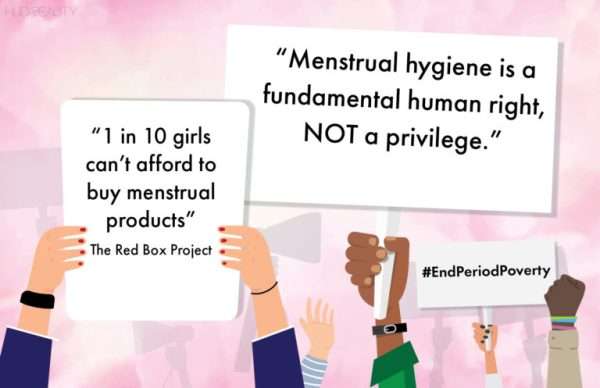
Prior to attaining puberty, 15-year-old Tolani had heard much about menstruation and eagerly looked forward to the experience. Unknown to her, the commencement of her menses would drastically mess with her dignity and confidence through period poverty.
“My menstrual cycle began at the age of 13, and being a child from a very humble background, my widow mother could hardly afford our daily meals, not to talk of purchasing sanitary products for me. She introduced the use of rags to me, as the way to go, because that had been her way of managing it-
“This comes with lots of stigma and discomfort, as the rags do not fit in properly, which often leads to staining my uniform and other dresses. So, I’ve stopped attending schools on the first and second days of my period to avoid the embarrassment from my male classmates,” she narrated.
Period poverty is a lack of access to menstrual products, education, hygiene facilities, waste management, or a combination of these. While it is a global experience, with about 500 million women and girls worldwide affected, those in the low-income countries are more affected. This reality contributes to why millions of women and girls around the world are stigmatised, excluded and discriminated against simply because they menstruate.
Unsurprisingly, the Partnership for Maternal, Newborn, and Child Health (PMNCH) has raised the alarm over discrimination against women and girls because of their natural bodily function of menstruation. Many are prevented from getting an education, earning an income and fully and equally participating in everyday life.
To stem such abuse, the World Health Organisation (WHO), in its statement on menstrual health and rights, upholds menstrual health as a health and human rights issue and not a hygiene issue. Moreover, in its commitment to breaking the silence and stigma associated with menstruation and to make schools, health facilities and other workplaces menstruation-responsive, the apex health body has charged health policymakers and programme managers to engage with all sectors to promote the rights of women and girls who menstruate and meet their comprehensive menstrual health needs.
Lingering challenge
In spite of this global move to end period poverty, a recent ActionAid report indicates that one in 10 girls in Africa miss school because they don’t have access to menstrual products, or because there aren’t safe, private toilets to use at school.
In her remarks at the last Menstrual Hygiene Day, commemorated on 28 May, former Minister of Women Affairs Pauline Tallen, disclosed how more than 37 million girls and women in Nigeria were struggling to access menstrual hygiene products. This means that, every month, more than 37 million girls and women are unable to safely manage their periods, limiting their ability to study, work and live their lives.
Mrs Godwin, a petty trader at the Mushin Market, Lagos, attested to this grim reality on menstrual poverty as she revealed that it is always a challenge for her to sell in the shop on the first two days of her period. According to her, she usually experiences a heavy flow that comes with vomiting; yet there is no clean toilet or changing room close by.
She further disclosed that the market environment usually aggravates her nausea, due to the lack of hygiene facilities. “For the two days I miss market in a month, I lose about N60,000, and other opportunities. This is usually a painful loss to me, but I have no choice than to stay back,” she said.
The ActionAid report further corroborates Tolani’s and Godwin’s experiences, as it states that one in four women in their menstruating years’ experience “period poverty,” from their inability to purchase the products they need, as well as inability to be at work or school because of it. “More than 90,000 girls stay away from school because they cannot afford pads or tampons,” it states.
Health implications of period poverty
Medical experts affirm that period poverty causes physical, mental, and emotional challenges. It can make people feel ashamed for menstruating, and the stigma surrounding periods prevents individuals from talking about it.
Like Tolani, the reality is that people rely on “sanitary products stand-ins”, such as toilet paper, paper towelling, rags, and cardboard, to manage blood flow. Rationing or using products longer than recommended also happens. The result? Physically, these unsanitary conditions can lead to gynaecological conditions that include toxic shock syndrome, bacterial vaginosis, urinary tract infections, as well as skin infections, among other concerns. This ordeal can be incredibly stressful and can cause people to miss school, work, and generally, life.
A 2018 study conducted in India established a correlation between inadequate menstrual hygiene practices and a higher prevalence of yeast infections, urinary tract infections, bacterial vaginosis, and trichomoniasis. Additionally, leaving a tampon in for an extended period can lead to the rare but severe condition known as toxic shock syndrome, the experts found.
Another empirical research published in BMC Women’s Health found an increased risk of urogenital infections, such as yeast infection, vaginosis or urinary tract infections, when women and girls are not able to bathe and/or change or clean their menstrual supplies regularly.
For Chichi, a JSS 3 student, she uses tissue paper for her period due to the inability of her pensioner father to purchase sanitary pads for her. She revealed that, while she had managed to cope, she also observed different infections around her genitals, which require prolonged treatment.
“My approaching period has become a nightmare for me, because I know the use of tissue paper will definitely attract an infection, whether minor or major, to my private part, but I’m helpless because I can’t afford the exorbitant sanitary towels. An alternative for me is to use rags and wash thereafter, but the lack of soap and water at every point in the day always frustrates this.
“It will be a welcome idea if government can assist in reducing prices of these sanitary products for school-age girls like me to relieve us of this burden at the stage of life,” she pleaded.
Socio-economic impacts of period poverty
In an exclusive interview with Chaste Inegbedion, founder of the End Period Poverty initiative, he lamented the inadequate sanitation facilities in schools and communities, which continue to compound the problem.
“As a result, girls might miss school during their periods, hindering their education and opportunities for advancement.” He also condemned cultural taboos and stigmas surrounding menstruation, saying such often leads to social exclusion and discrimination.
According to him, tackling period poverty requires comprehensive efforts that encompass affordable access to menstrual products, education about menstrual health and hygiene, as well as destigmatisation of menstruation. “Initiatives, organisations and advocates are working towards those goals to ensure menstrual equity, and improve the overall wellbeing of individuals affected by period poverty,” he said.
Multidimensional approach
Ending menstrual poverty requires a multisectoral approach, as menstruating people work in all sectors of the economy. Thus, WHO’s directive to all governments is to formulate policies that will mandate schools, workplaces and public institutions to be supportive of managing menstruation with comfort and dignity.
More importantly, developing nations are charged to normalise menstruation, by breaking the silence around it, as well as removing tariffs from sanitary materials to make them affordable to the less-privileged in the society.
In a chat with Pharmanews, a seasoned psychologist at the Lagos State Ministry of Education, Dr Olubukola Rosanwo, harped on the need for NGOs and other philanthropists to alleviate the period poverty of secondary girls through regular supply of sanitary materials and refurbishment of dilapidated facilities to enhance menstrual health and dignity among girls.
Rosanwo, who is an assistant director of education said, “For girls within secondary school age, some of them don’t even understand what they are going through, while the situations around them are not encouraging. Some of them don’t have money to buy sanitary pads, and knowing the implications of that on their health, we are appealing to NGOs and other organisations to come to the aid of these children, because they are the future of the country.”













